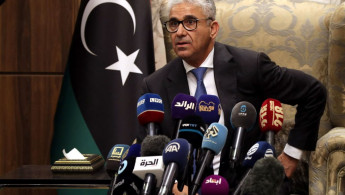Libya's PM Bashagha denies penning anti-Russia Times article
Libya’s Prime Minister-designate Fathi Bashagha has denied writing an anti-Russia article for the British newspaper The Times, a day after the article went online.
On Tuesday, The Times published an article, titled ‘Libya wants to stand with Britain against Russian aggression’, under Bashagha’s name and picture.
The article scathingly criticised one of the long-standing international supporters of Bashagha’s foe-turned-ally Khalifa Haftar.
“Today my country is facing one of its toughest battles yet; as Ukrainian troops battle Russia with British missiles, we in Libya are fighting the same fight,” the PM-designate allegedly wrote.
Addressing his “British friends” at Downing Street , the Libyan official allegedly said in the article that his government is ready to work with the UK if the latter needs a partner in Africa to resist Russia.
“My British friends, if you want a partner in Africa to push back against #Russia, then my government is ready to work with you — it is your only viable partner,” added the article.
However, Bashagha, who is one of two rival Libyan prime ministers, has distanced himself from the published op-ed, calling the published column “fake”.
“I was surprised by an article attributed to me in the English newspaper the Times. I hope this grand and respected newspaper inspects accuracy to avoid being involved in publishing false articles,” Bashagha tweeted in Arabic on Wednesday.
The Libyan parliament has approved a government led by Bashagha to replace the interim administration of Abdul Hamid Dbeibah, who has vowed not to cede power.
In a statement to The New Arab, the Times has approved the authenticity of the article as written by Bashagha.
"We stand by our publishing of this article and Fathi Bashagha's staff have confirmed to us it is accurate,” Times’ spokesperson told The New Arab on Thursday.
The mystery behind the article’s hubbub remains open to guesswork.
Some analysts assume that Bashagha’s denial reveals tensions that the article may have erupted between Bashagha and his Pro-Russia military ally Haftar.
“Even if written by his lobbyists - coming out publicly to refute writing the article implies there's trouble in paradise vis-à-vis Bashagha's ally, Haftar, who is very much dependent on Russia,” said Emadeddin Badi, a political analyst, on Twitter.
Meanwhile, many others say the controversy reflects Bashagha’s double speech whenever he switches from Arabic to English, recalling examples from his political history.
In his televised speech as a PM, Bashagha did not mention Putin's offensive on Ukraine, which was dominating world news.
Right after his speech, Bashagha went on to tweet in English his opposition to the war in Ukraine.
The politician, who was a former interior minister, has in the past worked with western lobbying groups and PR firms and has had several articles published under his name in English-language newspapers.





 Follow the Middle East's top stories in English at The New Arab on Google News
Follow the Middle East's top stories in English at The New Arab on Google News


